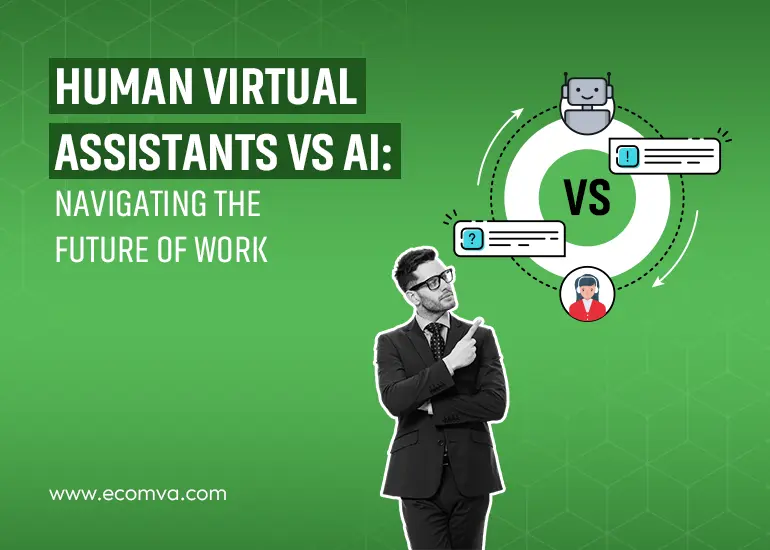Which is better for your business: Human Virtual Assistants or AI?

Did you know that AI tools can never give the same sense of empathy that a human can? This is even more important when thinking about your business. Would you rather have a Human Virtual Assistant or an AI virtual assistant handling critical aspects of customer service, marketing, or administrative support? While both options have strengths, choosing the best fit depends on your business needs and priorities. This article explores the unique benefits of Human Virtual Assistants and compares them to AI virtual assistants to help you make the most strategic choice.
Understanding the Options
A. Human Virtual Assistants
A Human Virtual Assistant professional can offer personalized, adaptable, and emotionally intelligent support for your business. Unlike AI, they understand the nuances of human interaction, providing an empathetic response to customer queries, managing sensitive tasks, and offering strategic insights. Tasks human VAs excel at include eCommerce support, client communication, and decision-making, making them especially valuable for functions that require a deeper understanding of the customer journey.
Some key strengths of Human Virtual Assistants include:
- Emotional intelligence in VAs: Human VAs can pick up on mood shifts, adapt communication styles, and empathize with customer concerns.
- Adaptability: Unlike AI, human VAs can quickly adjust to unexpected situations or unique tasks.
- Industry-specific skills: Human VAs often specialize in eCommerce management, allowing them to offer tailored support to eCommerce store owners or entrepreneurs.
B. AI-Powered Virtual Assistants
AI virtual assistants, like Siri, Alexa, and ChatGPT, offer fast, data-driven support and can perform repetitive tasks accurately. With advancements in Natural Language Processing (NLP), AI virtual assistants can handle vast amounts of data and respond to questions based on patterns and pre-programmed information, making them ideal for routine tasks that don’t require personalization.
Key features of AI virtual assistants include:
- Scalability: AI virtual assistants can simultaneously manage high volumes of requests, making them suitable for businesses with large customer bases.
- Consistency: AI tools operate with uniform accuracy and don’t face fatigue, maintaining efficiency throughout.
- Cost-effectiveness: AI virtual assistants often offer a more budget-friendly option for routine tasks like data entry or standard inquiries.
Key Comparisons Between Human Virtual Assistants and AI Virtual Assistants
| Aspect | Human Virtual Assistants | AI-Powered Virtual Assistants |
|---|---|---|
| Emotional Intelligence & Personalization | Human VAs excel in emotional intelligence, adapting to client needs | AI VAs lack true empathy but can mimic basic responses |
| Adaptability & Problem-Solving | Skilled at resolving unique and complex challenges | Effective with data-driven and predictable tasks |
| Communication & Language Processing | Natural fluency, understanding of context and tone | Advanced NLP but limited in understanding subtleties |
| Availability & Scalability | Limited working hours but flexible | 24/7 availability and scalable for high volume |
| Cost Considerations | Higher initial costs but greater return on tasks requiring empathy | Cost-effective for routine, repetitive tasks |
A. Emotional Intelligence and Personalization
Human Virtual Assistants stand out for their ability to empathize, respond to unique client needs, and understand nuances in communication. This is critical in customer service, where a Human Virtual Assistant can recognize a frustrated customer and handle the situation with tact and empathy, traits that AI cannot fully replicate. While AI virtual assistants can automate responses based on pre-set patterns, they lack the emotional depth needed for complex client interactions.
B. Adaptability and Problem-Solving
In scenarios that require on-the-spot thinking, Human Virtual Assistants excel. Their ability to manage open-ended queries and offer customized solutions makes them irreplaceable in roles where entrepreneurs and startups face unpredictable challenges. AI virtual assistants can handle repetitive tasks efficiently but are limited by pre-programmed data, making them unsuitable for tasks needing human intuition or adaptable problem-solving.
C. Communication and Language Processing
A Human Virtual Assistant offers precise and natural communication, often able to interpret humor, cultural nuances, and subtle tones. This makes them ideal for engaging clients on a personal level. AI virtual assistants, while improving in Natural Language Processing (NLP), still miss out on these nuances, limiting their effectiveness in emotionally complex or context-driven conversations.
D. Availability and Scalability
AI tools are available 24/7, making them valuable for routine tasks that require immediate responses. AI virtual assistants can handle inquiries, send reminders, and manage scheduling tasks efficiently at all hours. Human Virtual Assistants, although limited to typical working hours, offer flexibility and are often willing to adjust their schedules to meet client needs, especially for high-value clients or critical tasks.
E. Cost Considerations
While the upfront cost of hiring a Human Virtual Assistant can be higher, their value in roles requiring judgment, personalization, and client engagement often yields a high return on investment. For businesses prioritizing cost efficiency, AI virtual assistants can handle high volumes of data-driven tasks at lower costs, making them an economical choice for repetitive or standardized work.
Industry-Specific Applications
A. Healthcare
Human Virtual Assistants are crucial in managing patient interactions in healthcare, where empathy and understanding are key. They assist in scheduling, answering queries, and following up on patient care, tasks where human interaction matters. AI virtual assistants are suited for routine data entry, managing patient records, and sending reminders, creating efficiencies without compromising patient experience.
B. Banking and Finance
Human virtual assistants (VAs) are essential for client relationship management in banking. They offer personalized assistance and respond to complex financial inquiries. AI virtual assistants can efficiently manage transactional inquiries, routine account services, and fundamental questions.
C. Education
Educational institutions benefit from Human Virtual Assistants who engage with students and handle academic questions, offering personalized guidance. AI virtual assistants streamline administrative tasks, such as managing schedules and sending reminders, improving operational efficiency.
D. E-commerce and Customer Service
For eCommerce store owners, Human Virtual Assistants handle customer concerns, process sensitive queries, and manage customer feedback. In contrast, AI virtual assistants efficiently handle high volumes of inquiries, track inventory, and manage repetitive order queries, enhancing the shopping experience.
The Synergy of Human and AI Assistance
Combining Human Virtual Assistants and AI virtual assistants allows businesses to optimize efficiency without sacrificing the personal touch. AI can handle high-volume tasks, allowing human VAs to focus on complex or high-value responsibilities. This hybrid model ensures that businesses can meet customer needs quickly while maintaining strong client relationships.
Future Trends
A. Advancements in AI Technology
AI technology is constantly evolving. With Natural Language Processing (NLP) advancements, AI virtual assistants are expected to improve handling personalized interactions and complex inquiries. However, they will still lack true emotional intelligence, making human virtual assistants essential for complex decision-making and empathy roles.
B. Evolving Roles of Human Virtual Assistants
As AI takes over routine tasks, Human Virtual Assistants will likely focus on specialized roles requiring emotional intelligence, strategic thinking, and creativity. Their adaptability and understanding of complex tasks will make them increasingly valuable for entrepreneurs and business owners looking to scale.
Making the Right Choice for Your Business
Choosing between a Human Virtual Assistant and an AI virtual assistant depends on your business’s unique needs. Human VAs are irreplaceable for tasks that require empathy, adaptability, and critical thinking, while AI virtual assistants offer scalable solutions for data-driven and repetitive tasks. A combined model might be best for businesses that balance cost efficiency with personalized customer service.
Conclusion
The debate between Human Virtual Assistants and AI virtual assistants reveals that both have distinct advantages. Human VAs bring empathy, adaptability, and strategic thinking, whereas AI virtual assistants provide consistent, round-the-clock support. By leveraging both, businesses can enhance productivity, customer satisfaction, and operational efficiency, ultimately creating a balanced approach that prioritizes technological advancement and the human touch.











